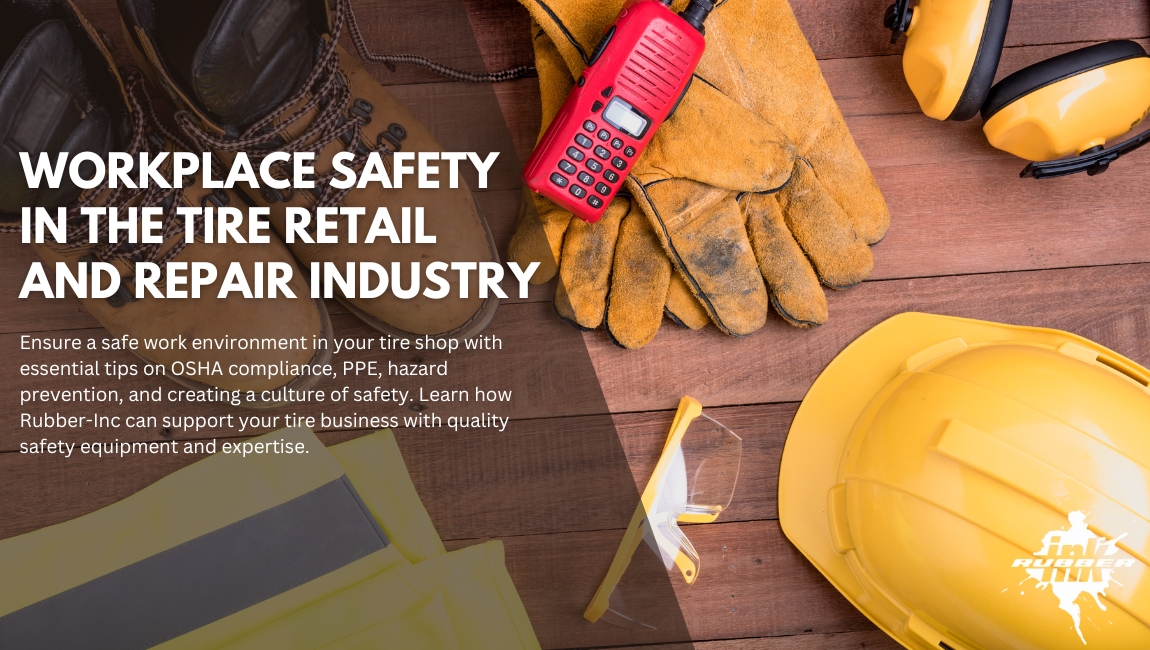Creating an account with Rubber-Inc. is quick and easy. Join Now

Workplace Safety in the Tire Retail and Repair Industry
Maintaining high safety standards in your tire business will help you attract and keep the best employees, save you money by preventing fines and insurance premium hikes, and keep customers coming back by creating a culture of attention to detail and dedication to getting the job done right. However, a safe workplace doesn’t happen just by telling your employees to stay safe. In this article, we’ll consider some of what it takes to ensure your tire shop is a safe working environment.
Regulatory Compliance
Workplace safety isn’t just a good idea: it’s a legal requirement. Like any other business, tire shops need to comply with OSHA regulations. OSHA (the Occupational Health and Safety Administration) was created by the U.S. Congress in the 1970s to develop and enforce standards for safe workplaces. Employers who fail in their responsibility to keep the workplace free of safety and health hazards can be penalized with fines.
OSHA has specific regulations relating to workers who service tires on trucks, trailers, buses, and other large vehicles. These standards mandate that employers train all employees on safety procedures and ensure that all employees demonstrate the ability to follow them; that proper restraining devices are provided for inflating tires; and that wheels and wheel components are inspected prior to assembly and after tire inflation, among other requirements.
Shops that only work on passenger car and light truck tires aren’t subject to such specific and stringent regulations, but still have a “general duty” to assess the potential hazards of the workplace and take whatever steps are necessary to keep employees safe. Some examples include ensuring safety locks on lifts work properly and that spilled oil is promptly cleaned up.
Safety Equipment
All employees in a tire shop should be required to wear properly fitting personal protective equipment (PPE).
OSHA regulations require wearing eye and face protection in any job where employees might be exposed to hazards like liquid chemicals, acids, gases, or flying objects.
Depending on the task being performed, like using a bead setter or air hammer, tire shop employees might also need hearing protection. Some people prefer earmuffs for hearing protection, while others find that disposable ear plugs are more effective and convenient.
Wearing gloves is essential to protect the skin from the chemicals commonly found in an automotive workplace. Disposable nitrile or latex gloves can be adequate in the short term and it’s a good idea to have them available in the shop, but for long-term protection, consider chemical-resistant and welding gloves. For other types of tasks, employees will need specialized mechanics’ gloves with padding which protects the hands and wrists from vibration and impacts.
As in any environment where employees work with heavy machinery and carry heavy objects, steel-toed boots are recommended in a tire shop to protect against injuries from dropping or tripping accidents.
OSHA standards mandate that workplaces have a properly stocked first aid kit. Every shop should also have fire extinguishing equipment on hand, and employees must understand how to use it. Check with your local emergency services to see whether they offer any training or demonstrations on fire safety and emergency first aid.
Creating a Culture of Safety
A safe work environment in a tire shop requires buy-in from the entire team, and the recognition that keeping everyone safe is a team effort. Unfortunately, cutting corners on safety practices is a common problem. Workers may think that their high level of experience and skill makes following typical safety procedures unnecessary. They may find wearing personal protective equipment inconvenient.
It’s imperative that shop managers and owners set the tone of taking safety seriously by not just writing but enforcing safety policies. If employees are reluctant to follow safety procedures, talk with them to find out why. Perhaps uncomfortable PPE can be replaced with better-fitting alternatives. If employees feel that safety procedures are making jobs fall behind schedule, consider what can be done to make employees feel less rushed. Remind senior employees that no matter how experienced they are, they aren’t immune to making mistakes, and that it’s up to them to set an example of proper attention to workplace health and safety for their less experienced co-workers.
At the same time, managers and owners shouldn’t assume that they’ve thought of everything when it comes to safety standards. Instead, leadership should actively seek out employee input on improving safety practices. Be open to suggestions and take issues raised by employees seriously. OSHA’s documentation on workplace safety standards notes that the best possible safety protections for employees require “the cooperative efforts of both employers and employees.” Creating a safe workplace is about more than any specific equipment or procedure, it’s about creating a culture where ensuring safety is a top priority and everyone takes responsibility.
Make Your Facility Safer with Rubber-Inc
Rubber-Inc is committed to being a trusted supply partner for everything your tire business needs, including what you need to keep your shop running safely. We carry a complete range of essential safety equipment, from first aid kits to face shields. Get in touch with us now to see how we can help.
Copyright © 2025, All rights reserved by Rubber-Inc.
